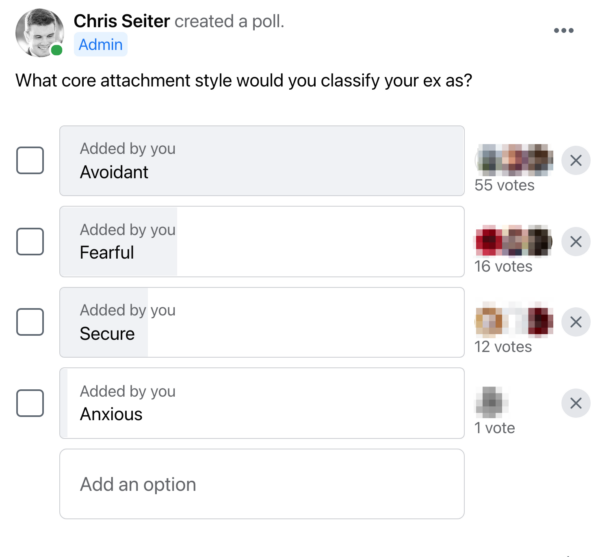Today we’re going to be looking at fearful avoidants and answering if they have regret after their breakups.
The fearful avoidant will typically go through a period of euphoria after a breakup due to their newfound freedom from the confines of the relationship. However, that doesn’t mean they won’t eventually regret the breakup. In our experience it’s only after a period of nostalgia due to time that those regrets begin to creep in.
Of course, in order to fully understand the complicated actions of a fearful avoidant we must first accept a few critical truths.
- The fearful avoidant actually prefers to be in a constant state of rejection
- They will typically only pay attention to the future and disregard the past completely
- The fearful avoidant won’t begin to mourn the loss until it’s impossible to reunite with you
- If you exhibit any type of anxious behavior they won’t be regretting the breakup
Let me expand a bit.

What Are Your Chances of Getting Your Ex Boyfriend Back?
Take the quizThe Fearful Avoidant Prefers To Be In A Constant State Of Rejection
So, I’ve talked a lot about this concept in past articles but I’ll cover it again here.
A paradox lies at the heart of every avoidant.
They want love but at the same time they don’t want to let anyone too close to give them that love for fear of being hurt.
The result is that often they’ll exist in this limbo where they always have one foot out the door.
How often have you heard a fearful avoidant say or do the following things?
- “I’m not ready to commit right now.”
- Refusing to talk about deep personal thoughts with you
- Letting one tiny imperfection ruin the entire relationship
- Flirting with others as a way of sabotaging the relationship
- Refusing to say “I love you”
The key component here is they layer all of these negative signals with positive ones making it confusing as to what their true intent actually is.
So, I want to preface this by saying that I’m a gigantic nerd.
Like GIGANTIC.
I went through this whole phase in 2018 where I decided I was going to start video essay channel on my favorite stories. So, I spent around eight hours writing and editing a video essay on “The Handmaids Tale.”
Here’s the video in case you were curious.
I noticed a really interesting phenomenon in that show.
Usually one good deed is followed by a bad deed and then the cycle repeats over and over again leaving the viewer confused on how to feel about characters they hate.
This is exactly how you should be looking at fearful avoidants. They will constantly send mixed signals because they are most comfortable existing in that limbo area. One where they don’t have to fully commit or even if they are fully committed they can say or do something to create a grey area.
This is an important phenomenon to talk about because it will give you the insight into how their eventually regret can creep in.
Let’s move on to talking about another interesting thing I’ve noticed about fearful avoidants.
The Fearful Avoidant Will Typically Pay Attention To The Future And Disregard The Past
Why?
Well, we think it’s because anything that forces a fearful avoidant to look inwards and understand their makeup is too heavy for them.
Yet like the concept of fate, it always eventually happens at one point after a breakup.

What Are Your Chances of Getting Your Ex Boyfriend Back?
Take the quizLet’s say that I’m your ex and I’m a fearful avoidant.
Throughout the relationship as your anxious behavior has set me off I begin to get the grass is greener syndrome. Every day I sit back and think,
“I can do better than her.”
This thought is essentially an admission that I’m thinking only of the future by replacing you with someone better as opposed to trying to fix the present or look at how my past is affecting me I prefer to go after the lowest hanging fruit with the future.
How often have you heard a fearful avoidant say,
“That’s in the past.”
This is literally a coping mechanism to help them to avoid painful emotions associated with either the present or the past. Again, it further proves why it takes so long for an avoidant to feel regret.
Understanding When A Fearful Avoidant Will Actually Feel Regret
I hate to sound like a broken record because I talk about this all the time but I feel it’s important to mention.
2019 and 2020 were the year of the interview for me.
I conducted dozens of interviews with our success stories to find out what worked for them.
Like this one,
And this one,
I already knew that most of the clients that work with us are anxious while their exes tended to be more avoidant.
But what really shocked me with our success stories had to do with the timing of when the emotions of the breakup hit them. With most attachment styles there is an immediate grieving process that begins.
Secure people grieve.
Anxious people REALLY grieve.
But avoidants… well, they have a wave of relief that overtakes them initially. This euphoria is often rooted in a release of pressure due to the confines of a relationship breaking down.
But that doesn’t mean they don’t grieve.
This might be crazy to wrap your head around but we’ve found consistently among our success stories that avoidant exes tended to come back after our clients completely moved on. Most of the time someone comes into our orbit wanting an ex back. This is energy that comes through when they begin the communication process with their ex.
If you’re overcome with this energy or extreme want it almost telegraphs your intentions and your ex is wary of everything you’re doing or saying.

What Are Your Chances of Getting Your Ex Boyfriend Back?
Take the quizYet our success stories would often give up on their exes after getting frustrated and THAT’S when they saw results.
Why?
Well, our research has shown that a fearful avoidant will only give themselves permission to “long” or have “nostalgia” for a breakup after they are sure there is no chance of a reconnection ever happening.
I talk about that concept a lot in this video.
But the theory behind it is sound.
We already know that an avoidant hates thinking about the past or the present. So, the only way they’d ever consider doing so is if all chances of reconnection are entirely removed.
AND ONLY THEN can they begin to feel regret.
But we also need to consider how the avoidant processes memories because the connection between memories and regret is a strong one.
Where The Peak-End Rule Plays Into This
Let’s imagine we have a fearful avoidant who has finally allowed themselves to think back on your time together.
What will they think about?
What memories creates nostalgia for them?
That’s where the peak-end rule comes into play.
So, what is the peak-end rule?
The peak–end rule is a cognitive bias that impacts how people remember past events. Intense positive or negative moments (the “peaks”) and the final moments of an experience (the “end”) are heavily weighted in our mental calculus.
Here’s a whole video about it.
Where it comes into play for us is the types of memories your ex is going to remember.
One of the reasons that I think our process of ex recovery is so successful is our ability to highlight the exact memories a fearful avoidant is having nostalgia on. Often we’ll tell our clients to subtly bring up the high points of their relationships and the results are undeniable if they’re brought up in the right way.
Since we know fearful avoidants are so future based often we’ll tell our clients to structure text messages in a way so that you can future pace events.
One of my most cherished memories with my wife is going on a private hot air balloon ride.

What Are Your Chances of Getting Your Ex Boyfriend Back?
Take the quizNow, for the fearful avoidant bringing this memory up at the precipice of a breakup is a recipe for disaster.
But bringing this memory up when there is no threat of a reconnection (or at least they believe there is no threat) and framing it in a way so that you are saying,
“You can feel this way again in the future”
Well, that’s their jam.
It’s all basic psychology but you need to understand how to communicate with a fearful avoidant. Unfortunately most of our clients don’t know how to do that yet.
If You Exhibit Anxious Behaviors After A Breakup They Won’t Be Regretting The Breakup
We already know that regret for a fearful avoidant doesn’t come until they feel safe to feel regret.
Usually that means “you’ve moved on to someone else” or you haven’t talked to them in a long time. The problem we see with most of our clients is their inability to control their anxious behaviors.
- What do I mean by anxious behaviors?
- You blow up your exes phone trying to get back in touch
- You contact them wanting to “fix things”
- You show up at their work
- You try to buy them gifts
- You leave a note on their doorstep or on the windshield of their car
- You try to get your friends to reach out for you
- You get the idea here
It’s only by moving past this anxious behavior that you can get the results that you want because ultimately all you end up doing when you exhibit this type of behavior is alienate your ex even more.
They’ll just dig in further and create this narrative in their head.
“See, I knew she wanted to force me to commit to her.”
Instead your ex should be saying,
“Wait, why doesn’t she want me to commit to her?”


Eric
January 29, 2023 at 12:56 pm
This is the most timely article I’ve ever read. I just broke up with my FA gf yesterday. I’ve never been with someone who pushed and pulled so much. Sometimes I could just see in her face that she was not ok mentally. Like the trauma was just permanently embedded. Man I love so much about her, but her total lack of emotional support was unbearable to me, and a bad sign of her ability to be a parent figure to my kids.
Still i almost reached out to tell her how great I think she is, because I wanted her to know I wasn’t rejecting her as a whole. Now I see how she would’ve thought that was a ploy to bring her back in. I’m holding fast to this no contact now. I realize that her internal world is a much different place than mine. For her own good, i do wish she was able to experience real emotions with another person though. Anyway, now it’s time for me to figure out why I stayed around after so many experiences with her where I knew the relationship wasn’t even close to what I really seek…a partnership built on support and emotional connection
Libi
August 21, 2022 at 1:26 pm
What if i’ve already begged and cried, and she seemingly gave it a short chance but then cut off?
Coach Shaunna Nicol
August 28, 2022 at 9:29 pm
Hey Libi, that is really common. Start your No Contact and work on yourself in that time